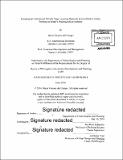Escaping an institutional poverty trap : learning behavior as a collective action problem in Brazil's pharmaceutical industry
Author(s)
Del Campo, Maria Victoria
DownloadFull printable version (17.00Mb)
Other Contributors
Massachusetts Institute of Technology. Department of Urban Studies and Planning.
Advisor
Ben Ross Schneider.
Terms of use
Metadata
Show full item recordAbstract
Why are so many countries persistently poor, underdeveloped, and unequal? Why does unevenness in resources and capabilities persist within productive sectors, even in developing countries that have managed to sustain handfuls of well-performing firms in modern sectors? The conventional knowledge about this persistence suggests that in the long run, historical institutions are the fundamental cause of economic outcomes, making history determine economic performance through its effect on institutional development patterns (Acemoglu and Robinson, 2001). These studies portray institutions as path-dependent and impervious to change, suggesting a pessimistic expectation for the development possibilities of poor countries. In contrast, this dissertation shows empirically how and why inefficient institutions that tend to persist over time can be altered, leading to unexpected upgrading and inequality reduction even in environments traditionally considered "hopeless" by the literature. Through a mixed methods approach incorporating qualitative methodologies to a traditional poverty trap framework, this work analyzes the effect of institutions on evolving micro-level attitudes towards learning in a complex, technologically-intensive industry plagued by high prices, widespread product safety challenges, and parasitic firm behavior. Using the experience of Brazil's pharmaceutical industry as a main case, with India and Mexico as shadow cases, the study concludes that in the context of extreme technological gaps, political domination by large economic groups, and structural constraints, inegalitarian and inefficient institutions become self-sustaining and make individual learning prohibitively costly for most local firms. This creates secular poverty traps where individual "low road" behaviors become prevalent among firms, resulting in a self-reinforcing intensification of uneven development. In such cases, learning --and escaping the trap-- necessarily becomes a collective action problem, where marginalized firms must cooperate to defray the costs of upgrading.
Description
Thesis: Ph. D. in Economic Development and Planning, Massachusetts Institute of Technology, Department of Urban Studies and Planning, 2016. Cataloged from PDF version of thesis. Includes bibliographical references (pages 268-279).
Date issued
2016Department
Massachusetts Institute of Technology. Department of Urban Studies and PlanningPublisher
Massachusetts Institute of Technology
Keywords
Urban Studies and Planning.